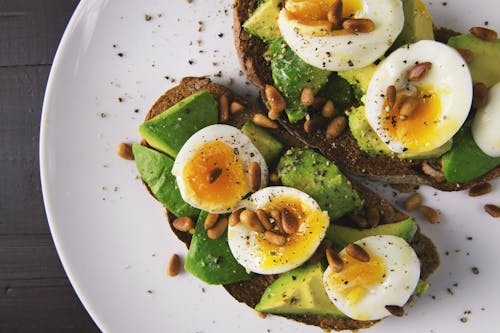
Developing a healthy relationship with food can be life-changing, especially when it comes to your health. Disordered eating is incredibly common, but developing a healthy relationship with food doesn’t have to be a challenging or far-fetched goal.
Unfortunately, most people don’t have the right mindful connection with their nutrition. When you’re firstborn, your relationship with food is at its most organic stage. You eat what’s available to you when you’re hungry and seek out the specific sources of nutrition your body craves.
As a child, you don’t worry about how many calories are on your plate, or whether your dinner is high in cholesterol. As you get older, you learn more about nutrition, which foods are good for you, and which foods you should try to avoid. From one perspective, this food-related education is a good thing. It means you can make better decisions tailored towards your health.
Your knowledge of which foods are “bad” for you, however, can also lead to unhealthy feelings of guilt, shame, and panic when you eat. These are the feelings that sometimes give way to eating disorders.
On top of that, many people don’t eat mindfully, and rather eat mindlessly when they’re bored at home. This is not a good relationship with food to have, especially if you’re in the habit of mindless late-night snacking.
So, how do you go about developing a healthy relationship with food?

Defining Your Relationship with Food
Before you can develop a positive relationship with food, you need to know where you currently stand. Notably, a good relationship with food has nothing to do with the quality of your diet, or how many calories you eat. Rather, it’s all about how and why you choose to eat certain foods.
If your decisions on what to eat are driven by feelings of guilt, obsession, and other negative emotions, this indicates a poor relationship with food. Below are some of the symptoms of an unhealthy relationship with food, to help you diagnose the issue:
- You feel guilty about eating certain foods
- You avoid or restrict certain foods obsessively
- Having specific rules about the food you can and can’t eat (not determined by health conditions like allergies and intolerances)
- Heavily relying on apps or calorie counting to tell you when to stop eating
- Ignoring the natural hunger cues of your body
- You’re frequently getting involved with diet fads
- You feel significant stress and anxiety eating in social settings
- Binge-eating certain foods to the point of being way too full and uncomfortable
- Mindlessly eating in front of the TV or while bored, even if you’re not hungry
- An inability to control or monitor portions
It’s also worth noting that your relationship with food can be transient. Some people eat with complete freedom sometimes, then feel restricted in what they can eat later. The goal of developing a healthy relationship with food is to have more positive experiences with what you eat.
What is a Healthy Relationship with Food?
The National Eating Disorders Association defines a healthy relationship with food as “relaxed eating”. You should feel entirely comfortable and not driven by any specific emotion in your decisions of what to eat. You should also eat mindfully.
Although it’s considered healthy to be aware of which foods are good for you and which aren’t, a healthy relationship with food recognizes there’s more to eating than just eating for fuel. Unlike animals eating solely for survival, human beings eat for pleasure, socialisation, tradition, and fun.
Signs that you’re developing a healthy relationship with food include:
- Giving yourself permission to eat foods you enjoy
- Listening to and respecting your body’s hunger cues
- Eating when you’re hungry and stopping when you’re full
- Not placing unnecessary restrictions on what you can eat
- Not allowing the opinions of others to dictate what you eat
- Not counting calories or stressing over your weight
- Eating foods in moderation (the right amount at the right time)
- Understanding you’re not defined by the foods you eat
- Choosing foods that make you feel good
Keep in mind, for many of us, our relationship with food is significantly influenced by societal expectations. A growing pressure to be “thin” and eat healthy foods at all times can be difficult to ignore. The world we live in means it’s not easy to simply stop worrying about what you eat. Building a good relationship with food takes time.
How to Build a Healthier Relationship with Food
If, after reading the symptoms above, you’ve decided you don’t have the best relationship with food, don’t panic. You can start to build a better connection with your nutrition.
Start by finding out which foods you actually have to restrict in your diet for legitimate health purposes. You can do this by using blood tests, allergy tests and DNA tests to determine which foods you’re genetically sensitive to. A CircleDNA test will help you to understand more about your food intolerances.
After you know what you can and can’t eat:
1. Give yourself unconditional permission to eat
This might sound simple, but most of us place a lot of conditions on being allowed to eat. If you’re trying to lose weight, you might tell yourself you can’t eat any foods which might influence your waistline. Or you might decide you can only eat a small portion of a certain meal.
Creating rules around when you can and can’t eat sets yourself up for hunger, fear of food, and feelings of deprivation. Ultimately, having a few extra cookies for dessert may be better than being too afraid to open the cookie jar.
2 Eat when you’re hungry
You are born with the natural ability to regulate your hunger. Children can easily tell when they’re full or hungry, but as adults, we tend to ignore our hunger pangs and focus on other stimuli instead. For instance, you might decide you’re “full” because your plate is empty.
On top of this, diet culture tells us we need to stick to a specific number of calories when eating each day, rather than just eating until we’re satisfied. The more you listen to your actual hunger cues, the easier it is to regulate your diet and appetite.
3.Try mindful eating
Mindful eating is perhaps the most important part of fixing a bad relationship with food. These days, many of us eat distracted, watching a show or checking our phones. This makes it harder to recognise the hunger and fullness cues we already have a hard time pinpointing.
Eating mindfully means eliminating distractions and focusing just on your food. You notice the taste and texture of the food, savour each bite and allow your body to tell you when you’re full. Eating mindfully helps you to identify the reasons for your food choices too. For instance, are you eating because you’re actually hungry, or just because you’re bored?
When eating, ask yourself:
- What flavours am I noticing right now, and do I enjoy them?
- How is this food changing my appetite?
- Does this food satisfy any cravings I had?
- Was I actually hungry when I decided to eat this?
- Is it possible that I’m eating for a different reason other than hunger, such as loneliness, boredom or stress?
- What made me choose to eat this?
4.Explore all kinds of foods
Over time, we gradually get into the habit of describing some foods as “bad” and others are “good”. While some foods are definitely more nutritious, eating a “bad” food from time to time isn’t necessarily going to cause serious problems with your health, unless you have an allergy.
One of the worst things about labelling foods as “bad”, is you often crave them more. The more you tell yourself you can’t have a certain food, the more you want it. One study tested this phenomenon by putting a group of dieters and non-dieters into private rooms where they could eat as many cookies as they wanted. The non-dieters were more likely to regulate their intake.
When you allow all foods into your diet, you’re less likely to binge or overeat when given a chance to “break the rules”. When you put all foods into the “okay” list on your diet, you’re also less likely to constantly want cookies and cake.

5.Don’t justify what you eat
Allowing yourself to eat anything also means you don’t have to justify what you decide to eat to anyone – even yourself. There’s no reason to tell someone you’re sitting with that you ordered a burger instead of a salad because you had a bad day. You also don’t have to explain having a salad for dinner because you feel like something fresh.
Just allow yourself to eat the food you feel is best for you in the moment.
Many of us assume the people around us are constantly examining our choices and judging them. However, the reality is that most people probably don’t notice, mind, or care what you’re eating. They’re too busy worrying about their own life to consider what’s going on in yours.
Developing a Healthy Relationship With Food Over Time
A person’s relationship with food can be a complex battle. Some people have a harder time overcoming bad habits and disordered eating compared to others. If this is the case for you, you might struggle to develop a healthy relationship with food on your own.
If you can’t stop obsessing over what you eat, you can’t stop mindlessly overeating, or you’re worried that your relationship with food is making you unhealthy, speak to a professional. There are doctors, dietitians, therapists, and other healthcare providers who can help you to understand your history with food, and guide you towards a better future. Some therapists specialize in disordered eating and can offer you a wealth of information.
Above all else, remember, all good relationships take practise to master, so keep working on it and don’t give up trying.






This Post Has 2 Comments
Comments are closed.